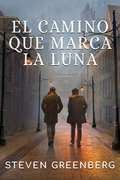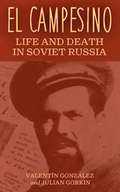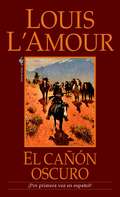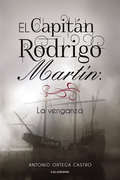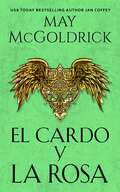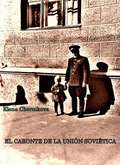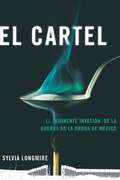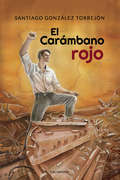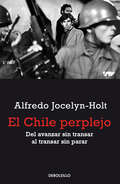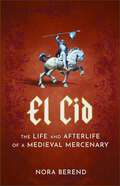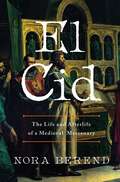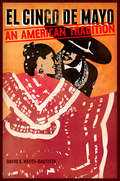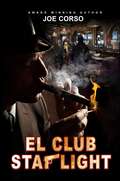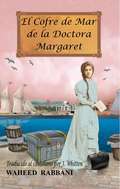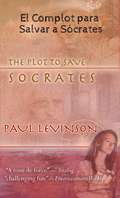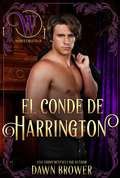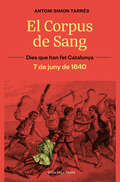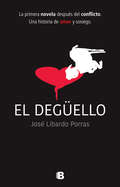- Table View
- List View
El Camino que marca la Luna
by Steven Greenberg¿Qué tanto se puede estirar el amor fraternal sin romperse? "...es una obra de ficción que proyecta una atmosfera histórica extraordinaria, además de los personajes que, una vez entran en tu corazón, permanecerán ahí por siempre”. ~ Valorado con 5 estrellas por K.C. Finn en Readers’ Favorite Book Reviews Samuel y Aaron Katz tuvieron una conexión muy frágil durante su infancia, misma conexión que se daña cuando Aaron deja una Polonia pre-Segunda Guerra Mundial para irse a Palestina, y luego se ve afectada de nuevo cuando Samuel es enviado a un Gulag Soviético en el ártico. Es entonces cuando Aaron debe decidir qué tan dispuesto está a ir para salvar a su hermano menor. Desde Polonia a un Tel Aviv en tiempos de guerra, desde un campo penitenciario soviético congelado a un Irán controlado por los aliados, y a las profundidades del Mandato de Palestina en sus preparaciones desesperadas para combatir la invasión Nazi, “El camino que marca la Luna” indaga en los lazos de la hermandad y las fuerzas que los intentan romper. “Los pasajes históricos y el viaje épico tratados con lujo de detalles, “El camino que marca la Luna” lleva de la mano al lector a través de los horrores de la Segunda Guerra Mundial, acompañada de unos personajes que son sensacionales. Resulta en un recorrido intenso, de esos que no permiten distraerse, obligándote a analizar hasta el más ínfimo detalle. Tiene lo mejor de cada género, ya sea el drama, los conflictos históricos, el romance o la acción en su máximo esplendor. Una obra que se quedará contigo eternamente”. ~ Valorado con 5 estrellas por Anne-Marie Reynolds en Readers’ Favorite Book Reviews EVOLVED PUBLISHING PRESENTA una atractiva historia que se desarrolla en 200 días de esperanza en 1942, cuando los judíos de Palestina vivieron el terror de una invasión Nazi. Del ganador del best seller Gale
El Campesino: Life and Death in Soviet Russia
by Valentin R. Gonzalez Julian GorkinEl Campesino: Life and Death in the Soviet Union, first published in 1952, is the dramatic autobiographical account of Spanish revolutionary Valentín Gonzalez (1904-1983). The book (also titled Listen Comrades: Life and Death in the Soviet Union) details Gonzalez’ experiences in the Spanish Civil War, his conversion to communism, and his flight to the Soviet Union following the Nationalist victory. In Russia, however, he is eventually arrested, tortured by the N.K.V.D., and sent to Vorkuta labor camp, a notorious part of the Soviet gulag located north of the Arctic Circle. Gonzalez, thoroughly disillusioned, manages to survive the brutality of the gulag, escaping Vorkuta (only to be recaptured and placed in a nightmarish cell filled with rats and snakes), and eventually completing his sentence and making his way across the border of the Soviet Union and into freedom in the west.
El Canon Oscuro: Una novela
by Louis L'AmourCuando Gaylord Riley se alejó de la banda de Coburn, llevaba dinero y un sueño. Trabajó duro y construyó una cabaña, reunió una manada de reses y se enamoró de Marie Shattuck.Pero al enfrentar falsas acusaciones de robo de ganado y asesinato, Riley se v e obligado a defender su nuevo estilo de vida de ciudadano respetuoso de la ley. Superado en número, y de cara a un escuadrón de linchamiento, Riley se sorprende cuando sus viejos amigos regresan a darle una mano. ¿Pero cómo podrán ayudarle sin que los atrapen y los metan a la cárcel? Con el sheriff local que ya sospecha de Riley, la banda de Coburn tendrá que tener buenos planes y actuar con rapidez. Pero eso no le será difícil. Fue haciendo justamente eso como se ganaron su reputaciónFrom the Paperback edition.
El Capitán Rodrigo Martín: La venganza
by Antonio Ortega CastroUn honor que restaurar, un viaje de iniciación, una venganza largamente esperada y una inesperada redención final. Finales del siglo XV e inicios del XVI. <P><P>Uno de los mayores acontecimientos históricos, el descubrimiento de América, y las posteriores expediciones llevadas a cabo por los europeos sirven como punto de partida para narrar las aventuras de Rodrigo Martín. Rodrigo se encontrará embarcado rumbo a La Española, en su huida de España. <P><P>Con una narrativa rápida y fácil, Antonio Ortega construye un relato de ficción ambientado en una época de gran esplendor para el Imperio español, pero donde también yacía, bajo las sombras, un mundo lleno de intolerancia, ambición y violencia.
El Cardo y la Rosa: ¡Atemporal y tumultuoso romance de las Highlands en medio del caos de la guerra! (La Familia Macpherson)
by Jan Coffey May McGoldrickUna heroína disfrazada. Un guerrero dividido. Un amor que arde entre las llamas de la traición y la guerra. La Familia Macpherson ¡Atemporal y tumultuoso romance de las Highlands en medio del caos de la guerra! Un viaje de coraje, pasión y destino… Celia Muir se encuentra en una peligrosa misión para huir de un castillo en llamas y evitar ser capturada por soldados ingleses en las escarpadas Highlands escocesas. Acompañada por fieles amigos y sirvientes, debe proteger al vulnerable bebé «Kit» de sombríos adversarios. Para conseguir la ayuda de Colin Campbell, un poderoso señor guerrero, Celia debe asumir la identidad de la seductora Lady Caithness, preparando el terreno para un peligroso juego de engaño y deseo. Un torbellino de amor y traición… Mientras las llamas de la guerra abrasan las colinas de Escocia, Colin se siente atraído por la enigmática Lady Caithness a pesar de sus recelos. En medio de traiciones y secretos que amenazan con separarlos, Celia y Colin se sienten irresistiblemente atraídos el uno por el otro. Su pasión enciende un amor que podría dar forma no únicamente a sus propios destinos, sino al futuro de su amada patria. Celia y Colin deben enfrentarse a sus miedos y deseos más profundos al embarcarse en un viaje que pondrá a prueba los límites de la lealtad, el amor y el destino en el tumultuoso telón de fondo de una nación asolada por el conflicto. ¡Ganador de dos premios Golden Leaf! ¡Los diez mejores romances de todos los tiempos!
El Caronte de la Unión Soviética
by Elena ChernikovaInterensantísima visión sintética de como un anciano vive la desapación de la Unión Soviética desde su empleo cotidiano como centinela del cementerio de Vorónezh.
El Cartel
by Sylvia Longmire¡LA INMINENTE INVASIÓN DE LA GUERRA DE LA DROGA DE MÉXICO! Tras haber observado los carteles mexicanos de la droga durante años, la experta en seguridad fronteriza Sylvia Longmire nos conduce a lo más profundo de ese mundo para ser testigos de una peligrosa subcultura clandestina que hará lo que sea necesario para proveer drogas a un bien dispuesto público de consumidores estadounidenses. Los carteles han crecido cada vez más en los últimos años, construyendo submarinos que suben por las costas de América Central y excavando complicados túneles por los que transportan drogas hacia el norte y por donde llevan de vuelta dinero en efectivo y armas largas de gran potencia fabricadas en Estados Unidos para fomentar la guerra del narcotráfico. Sirviéndose de su larga experiencia de trabajo con temas fronterizos, Longmire da vida a la real amenaza que representan los carteles mexicanos que operan no solo por toda la frontera del suroeste, sino también en lo más profundo de todos los rincones de Estados Unidos. Sylvia Longmire también ofrece soluciones reales a los críticos dilemas que enfrentan México y Estados Unidos, entre ellas programas para impedir que los jóvenes mexicanos se unan a los carteles y cambios en las leyes antidrogas a ambos lados de la frontera.
El Carámbano rojo
by Santiago González TorrejónVeinte años después de la guerra civil, España forma parte de la conferencia de repúblicas ibéricas tuteladas por la Unión Soviética. Veinte años después de la guerra civil, España forma parte de la conferencia de repúblicas ibéricas tuteladas por la Unión Soviética. Esta ucronía enmarca a los españoles en una sociedad alternativa a la que la historia les deparó. La novela nos sumerge en Madrid, año 1959, bajo un régimen comunista preponderante en el mundo. Un elenco de personajes acompañará a Dima durante todo el relato, mostrando las singularidades de la sociedad española de aquel momento. Dima, un joven universitario, se verá envuelto en una serie de acontecimientos que cambiarán por completo el devenir de su vida y de la propia nación española. Un destino que jamás hubiera imaginado: un liderazgo otorgado por una novela anónima en que todo un país quedó fascinado, el Carámbano rojo.
El Chile perplejo
by Alfredo Jocelyn HoltAlfredo Jocelyn-Holt, en El Chile perplejo, realiza un análisis histórico que va desde los años cincuenta hasta nuestros días para a nalizar cómo el malestar subterráneo que se esparció en el país pudo provocar conflictos mayúsculos, llevar a la toma de decisiones arbitrarias, quiebres institucionales e incluso a una pérdida de sentido político. Con una pluma audaz, el autor hace una interpretación polémica, prolija y documentada, e interpela al lector, conversa con él y propone una visión liberal de la historia. Un análisis desde la disidencia para defender tanto la búsqueda de interpretaciones históricas posibles como la postura moderada y paradójicamente atrevida: «esquivar los extremos, no caer en las dos trampas que se nos ofrecen: en la medida de lo posible o en la medida de la oportunidad».En esta reedición, Jocelyn-Holt va más allá en sus apreciaciones, con un nuevo prólogo y epílogo, que no hacen más que afirmar que El Chile perplejo. Del avanzar sin transar al transar sin parar es un libro clásico e ineludible para comprender la historia de Chile.
El Cid: The Life and Afterlife of a Medieval Mercenary
by Nora Berend'A fascinating study of historical mythmaking... Concise and absorbing'Paul Freedman, author of Out of the EastRodrigo Díaz lived a violently colourful life in eleventh-century Spain. An ambitious military leader, exile and brutal mercenary, he served Christian kings, fought against Christian princes in service of Muslim rulers, raided and killed Muslims and eventually struck out on his own, carving out an independent principality. While Rodrigo the man is long dead, El Cid lives on: a superhero; a quasi-saint; the 'spirit of Spain', according to military dictator Franco; and a champion of medieval Spanish multiculturalism. Nora Berend uncovers how el Cid has been transformed across the centuries, confronting the gulf between truth and legend and examining how a military adventurer became a hero to people on opposite ends of the political spectrum. What is it about this man that appeals to us? And why do we transform the most unsuitable people into heroes?'Would the real El Cid please stand up? Nora Berend's fascinating new book covers nearly a thousand years of history and myth-making about this eleventh-century warrior . . . and presents all the delicious ironies of history'Professor Marc David Baer, author of The Ottomans: Khans, Caliphs, and Caesars
El Cid: The Life and Afterlife of a Medieval Mercenary
by Nora Berend'A fascinating study of historical mythmaking... Concise and absorbing'Paul Freedman, author of Out of the EastRodrigo Díaz lived a violently colourful life in eleventh-century Spain. An ambitious military leader, exile and brutal mercenary, he served Christian kings, fought against Christian princes in service of Muslim rulers, raided and killed Muslims and eventually struck out on his own, carving out an independent principality. While Rodrigo the man is long dead, El Cid lives on: a superhero; a quasi-saint; the 'spirit of Spain', according to military dictator Franco; and a champion of medieval Spanish multiculturalism. Nora Berend uncovers how el Cid has been transformed across the centuries, confronting the gulf between truth and legend and examining how a military adventurer became a hero to people on opposite ends of the political spectrum. What is it about this man that appeals to us? And why do we transform the most unsuitable people into heroes?'Would the real El Cid please stand up? Nora Berend's fascinating new book covers nearly a thousand years of history and myth-making about this eleventh-century warrior . . . and presents all the delicious ironies of history'Professor Marc David Baer, author of The Ottomans: Khans, Caliphs, and Caesars
El Cid: The Life and Afterlife of a Medieval Mercenary
by Nora BerendExploring the creation of the El Cid legend over the centuries, this masterful and evocative biography peels away the layers of myth to reveal the real-life historical figure.El Cid was perhaps the most famous warrior involved in the indiscriminate fighting—irrespective of religion—on the Iberian Peninsula during the eleventh century. In the centuries after his death, he was transformed into a perfect Christian knight. In modernity, he was seen as the incarnation of Spain&’s special national character—Franco chose El Cid as the emblem of Nationalist Spain. Yet not only those on the political right, but many others, including academics and those on the political left, were in his thrall. He has been promoted both as the forerunner of white supremacists and of multiculturalism. How can we explain such a stupendous afterlife, and how can El Cid be a hero for so many different people? To begin to understand that, we must try to understand the truth buried beneath the myth. Nora Berend explores the creation of the legends over the centuries and reveals those active in its making. Medieval monks, the women in El Cid&’s family, a playwright, and a historian are among the creators of the mythic Cid. This riveting narrative seeks to explain their motives, and in so doing peels away the layers of legend to evoke the real-life historical figure.
El Cinco de Mayo
by David E. Hayes-BautistaWhy is Cinco de Mayo--a holiday commemorating a Mexican victory over the French at Puebla in 1862--so widely celebrated in California and across the United States, when it is scarcely observed in Mexico? As David E. Hayes-Bautista explains, the holiday is not Mexican at all, but rather an American one, created by Latinos in California during the mid-nineteenth century. Hayes-Bautista shows how the meaning of Cinco de Mayo has shifted over time--it embodied immigrant nostalgia in the 1930s, U.S. patriotism during World War II, Chicano Power in the 1960s and 1970s, and commercial intentions in the 1980s and 1990s. Today, it continues to reflect the aspirations of a community that is engaged, empowered, and expanding.
El Club Luz de Estrellas 7: Juego final.
by Joe Corso Zoila CanalesEl Club Luz de Estrellas 7: Juego Final. La fuerza especial contra el crimen esta detrás del Gran Red. No se van a detener ante nada para capturarlo, y el asesinato no esta fuera de la discusión. El Club Zebra 1962: Después de su baja del ejército, los chicos del vecindario estan celebrando el regreso de su amigo Renato. Sin embargo cuando lo ven del otro lado de la calle siendo golpeado casi hasta la muerte por el jefe de pandilla Marinero Burke, ellos lo persiguen. Cuando lo alcanzan, sin embargo, la situación cambia rápidamente, como era posible en esos día. El Club Luz de Estrellas 1965: Tarzán necesitaba otro cantinero y sugiere a Renato Mielina, a quien Red recuerda. Los problemas pronto vienen a tocar el la puerta de Red en la forma de Aldo Zintera, la nueva cabeza de las fuerzas especiales del F.B.I contra el crímen organizado. Zintera rápidamente informa a Red que tiene intensiones de procesarlo poe sus crímenes y enviarlo a prisión. Dándose cuenta en el real peligro en el que se encontraba y sabiendo que los cargos podían proceder, Red se embarca en una lucha por su vida. Red siempre cuidó de sus hombre, ahora tiene que ver por él y su nueva esposa.Él pronto se da cuenta de que solo hay un camino de acciones abierto hacia él, que pudiera parar al vengativo Zintera. Pidiendo favores y sabiendo que es el momento de acciones sin arrepentimientos, trama un plan drástico que incluye a su amigo Trenchie y no pierde tiempo en implementarlo. Una vez puesto en marcha, las cosas se calientan mientras Red y sus hombres luchan literalmente por sus vidas. La pregunta es... incluso con la influencia necesaria y la capacidad de tirar de las cuerda correctas... ¿Puede Red sobrevivir la embestida de Zintera?.
El Club Starlight
by Joe Corso Daniel MarchánEl Club Starlight: un mundo lleno de estrellas de cine, caballeros y asesinos ... "... Cubrió con cuidado las piernas del niño sobre la acera, volvió al automóvil, lo puso en marcha, y lentamente se adelantó hasta que el auto rebotó una vez, luego una segunda vez. Trenchie podía sentir el crujido del hueso contra el caucho, las articulaciones se separan, los tendones se estiran y se rompen, las piernas se vuelven papilla ... " Bienvenido al mundo de la mafia, un mundo donde los asesinos de sangre fría tratan el asesinato como si fuera "solo un asunto", pero al mismo tiempo, las mujeres son tratadas como mujeres. Conoce a Trenchie, quien acaba de ser liberado de su sentencia de diez años de prisión por homicidio. Una nueva vida está esperando, completa con sobres de dinero y un restaurante de carnes para llamar el suyo. Todo Y además al hombre "Jimmy The Hat", que encuentra fama inesperada en los lugares más inverosímiles, pero siempre se mantiene fiel a "los chicos", especialmente Big Red. "Crazy Joey Gallo" y sus hermanos se separan de la familia Profaci y ir pícaro, por su cuenta ahora. Solo recuerda: no te metas con "los chicos". Podría ser peligroso para tu salud. "La bala de calibre Colt 45 hizo su acción, llevándose consigo una porción considerable de cerebro, formando una niebla rosada, mezclada con hueso y materia gris". Es real. Es verdad. Yo deberia saber. Ambientada en 1960, esta historia de mafiosos de Nueva York te cautivará de principio a fin. Basado en hechos reales.
El Club Starlight - La Venganza
by Joe Corso Maria Julia Munoz SerranoDESCRIPCIÓN DEL LIBRO: PRECAUCIÓN: ¡Los nombres no han sido cambiados para proteger a los culpables! Los capitanes de Red Fortunato están de vuelta, pero esta vez Trenchie, Tarzán y Moose están en contra del gobierno. Ellos defenderán a su jefe hasta su muerte. También lo harán los residentes de Corona, Queens. Big Red es un icono de la ciudad natal, incluso venerado por la policía local. Cada año, Red permitía que el baile de la policía se celebrara en el Club Starlight y cada año, además de eso, Red compraba personalmente dos o tres mesas. Era su manera de apoyar al Fondo de Viudas y Huérfanos. Apadrinó a la Pequeña Liga de Beísbol de la Policía y suministró los uniformes para el equipo ". Todo estaba planeado - la visión de Joseph P. Kennedy - John como presidente, con Bobby y su creación de encabezados, siguiendo muy de cerca.las represalias de crimen sin sentido, Alrededor de todo estaría Teddy. Todos en la familia. Sí, los ingredientes de Camelot. "Ayúdame a que mi hijo Jack sea elegido presidente y yo me aseguraré de que te quiten a todos", prometió el patriarca Kennedy a la mafia. Seguir en la sombra de JFK es difícil para el hermano Bobby. Su personalidad es diferente. Cuando golpea, golpea duro , un trabajo que requiere un equipo de asesinos. Este es un trabajo para el Capitán James Lonegan y sus "Agentes Federales" - un grupo encargado de actuar como agentes de cumplimiento - pero sin registros de empleo, sin identificación, sin rastro de papel - hombres que no existen. Jimmy Hoffa no es el único. Hay otros cinco nombres en la lista de Bobby - todos los miembros de la comisión de delitos - Carlo Gambino, Vito Genovese, Sam Giancana, Joe Accardo y. . . Red Fortunato . Pero "los chicos" no se ensucian. No hay nada que la mafia odie más que una rata. Tú fisgoneas, tú pierdes lo que importa. Las reuniones secretas tienen lugar en los famosos hotel
El Club Starlight II
by Joe Corso Daniel MarchánEl Club Starlight de Red Fortunato en Queens está de vuelta, todavía lleno de mafiosos y sus "negocios" cada noche. Trenchie, Tarzan y Moose han regresado. La familia Genovese y otros pasan el rato en medio de la grandeza del bebé renovado de Red: El Gran Salón de Baile El director del estudio Columbia Pictures, Larry Bernstein, está siendo chantajeado. "Sabía que una vez que se hubiera intercambiado dinero, eso no evitaría ninguna demanda futura. Estas personas eran locas y las nueces significaban peligrosas. No había nadie en Hollywood en quien pudiera confiar. Esta fue la primicia de un columnista de chismes que podría arruinar el estudio". Big Red con entusiasmo ofrece asistencia, en sus términos, con una advertencia: una pieza de Hollywood, y Swifty, el hijo que nunca tuvo, es su boleto en el ring de boxeo y en glamour city. "Red era lo que algunos en el vecindario llamaban un 'dictador benévolo'. Sus vecinos lo amaban y sus enemigos sabían que él era el jefe de una familia criminal que contaba con mil hombres o más. Era un hecho que ningún crimen se llevaría a cabo en el territorio de Red. El resultado fue una represalia llamada "la ira de la Cabeza Roja". "Lástima que nadie le dijo al capo de Detroit hambriento de poder. Él violó las "reglas". El teléfono era una reminiscencia del teléfono rojo que conducía directamente a la Casa Blanca. La decisión del consejo se mantendría. "El jefe tocó los dedos de ambas manos dos veces. Esa fue la señal "para Red de que estaba bien proceder con justicia, estilo mafia". El automóvil avanzó lentamente hasta llegar a una enorme máquina amarilla. Fue la trituradora de automóviles. Reilly y sus hombres sabían al instante su destino. Hubo gemidos desde el interior del coche, hombres crecidos que suplicaban, suplicaban por sus vidas y suplicaban misericordia.
El Cofre de Mar de la Doctora Margaret
by J. Whitten Waheed RabbaniEl Cofre de Mar de la Doctora Margaret es el Libro I dentro de la trilogía de ficción histórica dentro del marco de la lucha de la India por la libertad-Azadi- libertad del Raj. Los libros tejen un relato de intriga internacional, conflicto y amor desgarrador entre personajes apasionantes de aquella época. En 1965 se descubre un cofre de mar de más de 100 años en un almacén de un hospital de Delhi, que se cree que era de una doctora americana llamada Margaret. A otro médico americano, Sharif, oriundo de Delhi, y que está contratado en el mismo hospital se le encomienda la tarea de localizar los familiares de la misteriosa mujer y devolverles el pequeño baúl. Sharif finalmente da con los descendientes de Margaret en Grimsby, Ontario, Canadá. Sus diarios y otros artefactos- como puede ser la corona del Reino de Jhansi- aparecieron en el cofre. Margaret, que nació en Nueva Jersey, nacida en una familia de clérigos Presbiterianos Escoceses consigue el deseo de su corazón que es de ser una de las primeras mujeres de Norteamérica en titularse como médico en 1850. Se casa con su primo canadiense Robert y viaja con él cuando va a servir en la guerra de Crimea en 1854. Mientras están en Crimea tienen que enfrentarse no solo a las dificultades relacionadas a las batallas, pero otros conflictos de otra índole. Derivado de los eventos que llevaron a la Carga de la Brigada Ligera de mal recuerdo, Margaret conoce a un oficial ruso el Conde Nicholai. El final sorpresa del Libro I, deja a Margaret en un trance difícil, sin saber si ha de buscar venganza o proseguir con su viaje a la India. Al final, está convencida de haber tomado la decisión correcta.
El Complot para Salvar a Sócrates
by Paul Levinson Lic. Liliana GandugliaEn el año 2042, Sierra Waters, a una joven estudiante graduada en Clásicos, le muestran un Nuevo diálogo de Sócrates, recientemente descubierto en el cual un viajero del tiempo argumenta que podría escapar de la muerte viajando al futuro. Thomas un académico mayor quien le mostrara a ella el documento, desaparece y Sierra inmediatamente comienza a investigar el origen del manuscrito con la ayuda de su novio de la Universidad, Max. La trama la lleva a las máquinas del tiempo en clubes de caballeros en Londres y Nueva York y al pasado - y a un viajero del tiempo proveniente del futuro, que se hace pasar por Herón de Alejandría en 150DC. Complicaciones, misterios, viajes, y giros en el tiempo proliferan mientras Sierra trata de discernir quien está planificando salvar al más grande de todos los filósofos de la historia de la humanidad. Personajes fascinantes desde Alcibíades hasta William Henry Appleton, el gran editor norteamericano del siglo diecinueve, hasta aparecen Hypatia, Platón y el mismísimo Sócrates.
El Conde De Harrington
by Dawn BrowerJonas Parker, el conde de Harrington no tiene ningún deseo de casarse. Él prefiere no tener problemas y una esposa complicaría las cosas. El Wicked Earls 'Club es su refugio y no está listo para renunciar al matrimonio. Su abuelo, el duque de Southington, no quiere nada más que verlo casarse y volver al redil. Por esa sola razón, evitará las damas adecuadas y las campanas de boda. A Lady Marian Lindsay le gusta ser una solterona y abrazar sus maneras de bluestocking. Está estudiando para ser médica y quiere ser una doctora adecuada. Ella anhela ser tomada en serio en el campo de la medicina, pero sus esfuerzos pasan desapercibidos. Después de una cuidadosa deliberación, concibe un plan que es infalible, pero necesita la ayuda de uno de los amigos de su padre para que esto suceda. Harrington está horrorizado por la solicitud de Marian y se niega rotundamente; sin embargo, de alguna manera logra convencerlo para que diga que sí. Antes de que se dé cuenta, la está acompañando a Kent y una fiesta en la casa hecha de sus peores pesadillas. La propiedad debe cumplirse a toda costa, porque él no se casará al final de su expedición, ¿o no?
El Conde de Latón
by Kara Jorgensen Camila JaraCuando Eilian Sorrell, un arqueólogo prometedor y el hijo mayor del conde de Dorset, pierde su brazo en un accidente de dirigible, teme enfrentar un futuro sombrío entre la aristocracia londinense. En su búsqueda por alcanzar la normalidad, lord Sorrell encarga un brazo prostético pero descubre que el artesano no es lo que parece. Después de la muerte de su hermano, Hadley Fenice queda a cargo de su negocio de prótesis, pero sabe que será una batalla difícil pues se desalienta a las mujeres a hacer el trabajo de un hombre. A cambio de construir un brazo eléctrico a lord Sorrell, él le ofrece que lo acompañe al desierto Néguev disfrazada de hombre como una oportunidad de libertad. Sin embargo, lo que se extiende bajo el desierto es más precioso que los fragmentos de vasijas o los huesos. Conforme se aventuran más adentro, descubren una sociedad donde la ganancia no es lo que controla el camino de la vida, sino que la pasión. Cuando los invasores imperialistas van en la búsqueda de una nueva colonia para arrasarla, Eilian y Hadley se ven forzados a defender su fugaz destello del paraíso.
El Conde de la Persuasión: El Club de los Condes Malvados (Colección/Series: Club de los Condes Malvados #3)
by Amanda MarielEL Señor Brian Kennington. Quinto Conde de Connlee, es un maestro de la persuasión. Cuando se cruza su camino con el de la no tan propia Señorita Minerva Fox, él determina que ella necesita un poco de emoción en su vida, y él justamente sabe cómo proporcionársela. Él vivirá a la altura de su apodo, el Conde de la Persuasión, mientras la lleva por un camino de aventura y romance. El único problema con su plan: El amor no formaba parte de la ecuación.
El Corazón de las Highlands: El Cuervo (Los Protectores de la Corona #1)
by April HolthausObligada a casarse con un despiadado Lord inglés, Adelyn Scott prefirió la muerte al matrimonio, pero no tenía ni idea de que su deseo se haría realidad hasta que descubrió el cuerpo de su marido yaciendo muerto en su habitación la noche de su boda. Como comandante de la guardia personal del rey, la lealtad de Eamon MacLeish nunca ha sido cuestionada. Hasta el día en que una misteriosa mujer llegó buscando asilo y le robó el corazón. Mientras Adelyn y Eamon reconstruyen las pistas que rodean el asesinato de su marido, Eamon debe elegir entre su lealtad o su corazón. Porque un camino llevaría finalmente a la muerte de ella, y el otro a la de él.
El Corpus de Sang: 7 de juny de 1640
by Antoni SimónEl relat viu i sagnant de la revolta que va desembocar en la ruptura entre Catalunya i la monarquia espanyola. El dia 7 de juny de 1640 un gran avalot protagonitzat per una massa de segadors entrats a Barcelona, així com per nombrosos membres de les capes populars de la capital catalana, va acabar amb la vida de Dalmau de Queralt, comte de Santa Coloma i virrei de Catalunya. Les ja molt tenses relacions entre les institucions catalanes i la Cort de Madrid entraren des de llavors en un punt de fissió de no retorn, tot desembocant en un procés revolucionari que portaria a la separació de Catalunya de la monarquia espanyola. L'eminent historiador Antoni Simon ens ofereix un relat viu i detallista d'aquells dies de revolta que van culminar amb l'assenyalada diada del Corpus de Sang, tot donant veu als nombrosos coetanis -pagesos, menestrals, jutges, nobles, eclesiàstics- que a través dels seusdietaris personals i epistolaris van deixar un testimoniatge directe d'un dels episodis més notoris de la Història de Catalunya.
El Degüello
by Jose Libardo Porras VallejoUna historia de amor durante el posconflicto. Anhela, una enfermera bogotana, y Pablo, un economista medellinense, coinciden en Mocoa para trabajar en Puerto Asís con un Programa de sustitución de cultivos ilícitos. En una sobria e inteligente narración el autor nos devela el choque entre dos mundos: el selvático y el urbano. Novela iniciática, pero también una historia de amor y sosiego. El amor crece y también la perplejidad de Pablo en un universo áspero y extraño. La vida marcha en su cauce normal hasta que una celebración le da un giro inusitado. Una tragedia interior nos hace pensar sobre cuál es la misión de cada uno en tiempos de transición e incertidumbre. Entre la ficción y la realidad El degüello explora sentimientos en territorios movedizos e inéditos.
